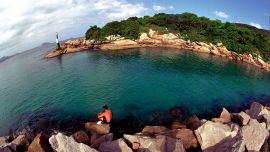This Tuesday, February 19, Senator Cristina Fernández de Kirchner turned 66. There was no big public birthday celebration, but the president showed her face, spending some of it hunkered down inside her political group’s bunker in the capital and travelling off for a meeting in Almagro, waving happily to fans outside as she came and went.
The occasion naturally drew attention on social networks, with no shortage of messages, whether in celebration or tones of mockery. The former president herself even broke one of her semi-regular online pauses, to post a picture of her alongside Macarena Sánchez, the female footballer fighting AFA for professional recognition and a message thanking all those who had wished her well.
But despite the activity online and in the streets, this week Fernández de Kirchner was mostly in the news thanks to the decision to postpone an upcoming trial, in which she is in the dock on corruption allegations, which was set to begin this coming Monday. Cristina and the courts: it is not a new association, but it is one the former president will have to get used to even more this year, with various other graft cases progressing too.
Birthdays are always a chance to reflect on the year that’s been and what lies ahead. And, for the former president, she could be forgiven if thoughts turned to the big moments on the horizon in 2019: this year’s presidential elections; the (eventual) beginning of her oral and public trial on accusations she favoured businessman Lázaro Báez with 52 public works contracts worth 46 billion pesos (US$1.2 billion); and the advancement of other cases in which she – and in addition, members of her immediate family – are being investigated.
Judicial clouds lie ahead, it seems, but so does opportunity.
ON THE BALLOT?
One of the biggest questions ahead in this coming year is whether Fernández de Kirchner will run in the presidential ballot. The feeling is she will (sources said to be “close to the president” have certainly briefed some outlets, including Reuters, to that extent) and despite the lack on unity evident in Peronism at present, several political leaders lean toward backing her candidacy. A recent list from Perfil included names like former Cabinet chief Alberto Fernández, the leader of the Kirchnerite caucus in the lower house, Agustín Rossi, the head of the national Justicialist Party (PJ), José Luis Gioja, and others who distanced themselves from Sergio Massa in October, such as Felipe Solá, Facundo Moyano and Daniel Arroyo.
However, the non-Kirchnerite Peronist space known as ‘Federal Alternative’ (“Alternativa Federal”) – which among others includes Juan Schiaretti, Miguel Angel Pichetto, Sergio Massa and Juan Manuel Urtubey – maintains that the best option for winning the presidency is to attempt to break through the bipolarism that exists between Mauricio Macri and Cristina Fernández de Kirchner.
The polls remain close: one on Wednesday (Ricardo Rouvier & Asociados, February 2019) showed the former president defeating the incumbent in a run-off by a wafer-thin 0.6 percent, well within the margin of error of any survey. More than 18 percent did not know who they would vote for in a head-to-head face-off – and a lot will happen before the first ballots are cast in October.
IN THE COURTHOUSE
On the other hand, a large part of the former president’s attention is likely concentrated at present on the Comodoro Py courthouse. Given the host of cases against Fernández de Kirchner, she faces a complex judicial panorama ahead.
On May 21, after a postponement to allow a judge to undergo triple bypass surgery, the first trial against her will open, addressing alleged corruption in public works projects in Santa Cruz, to the benefit of Lázaro Baéz. The businessman, Kirchnerite ally and owner of Austral Construcciones, along with former public works secretary José López and former federal planning minister Julio De Vido, among others, are also implicated in the trial.
Then there’s the now-infamous ‘cuadernos’ corruption cases, in which she is accused of being the head of a criminal network that stole millions of dollars between 2003 and 2015 (she is due to appear once again this week federal judge Claudio Bonadio), with countless others involved too. She is also under investigation in the so-called ‘dollars futures’ case, accused of “unfaithful administration to the detriment of public administration.”
Then there’s the case surrounding the Memorandum of Understanding signed with Iran, AMIA and Alberto Nisman, in which the authorities have asked for her to be jailed pre-trial (parliamentary immunity protects her), and the ‘Los Sauces’ case, in which she is accused of laundering money obtained through bribes via faked hotel rental contracts, and the ‘Hotesur’ case, with its charges of alleged money-laundering.
FAMILY AFFAIRS
But it would not be unfair to perhaps speculate that what most worries the president for the year ahead is her children’s f u t u r e , e s p e c i a l l y h e r daughter’s. In the aforementioned ‘Los Sauces’ case, Judge Julián Ercolini has sent the former head of state, her son Máximo Kirchner and daughter Florencia Kirchner to trial.
Unlike her family members, however, Florencia does not have any protection from an eventual prison sentence. While Máximo needs to stand in the upcoming elections to retain his seat in the Chamber of Deputies and thus, like his mother, the privileges that would shield him, Florencia Kirchner’s freedom is on the line. Facing potential prosecution and conviction in both this investigation and the ‘Hotesur’ case, Florencia would find herself behind bars if Ercolini found her guilty of the crimes against her and handed down a sentence of more than three years.
For Cristina Fernández de Kirchner, a momentous year lies ahead, without a doubt.






















Comments